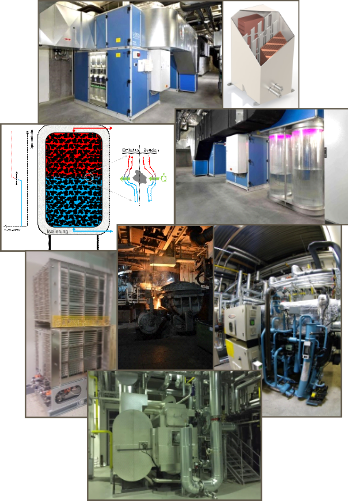Services
Sector Coupling
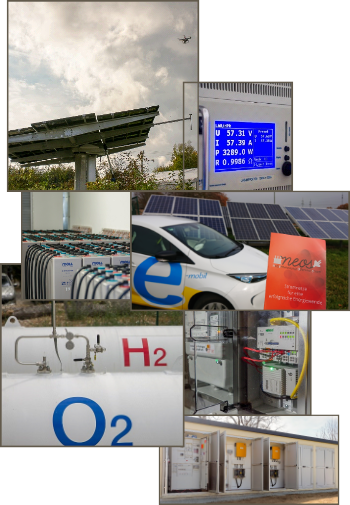
- Concept Development
- Design of energy concepts using renewable energies and (seasonal) storage of heat and electricity
- Plausibility checking, management, and visualisation of large data volumes and time series
- Power-to-Heat
- Economic viability studies
- Non-invasive evaluation of photovoltaic systems for PtH applications
- Power-to-X
- Performance optimisation for electrolysis processes
- Economic viability studies
Storage Technology
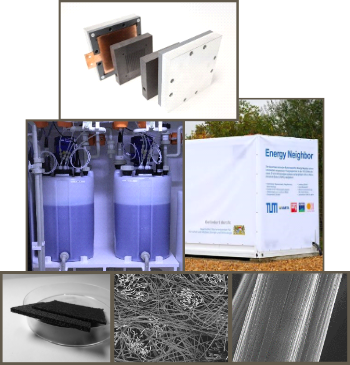
- Electrochemical Energy Storage
- Flow Batteries
- Development of cell components for redox flow batteries
- Continued development of cell design
- Electrochemical characterisation
- Techno-economic modelling of storage systems
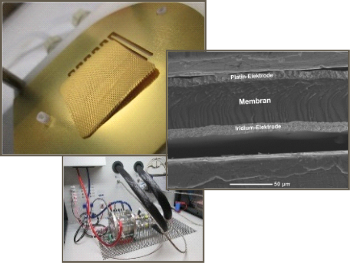
- Hydrogen/Electrolysis
- Analysis and optimisation of PEM electrolysis methods
- Development of cell components (e.g. electrode materials, membrane-electrode units)
- Catalyst screening, analysis of single cells and stacks (up to industrial scale)
- Investigation of ageing mechanisms
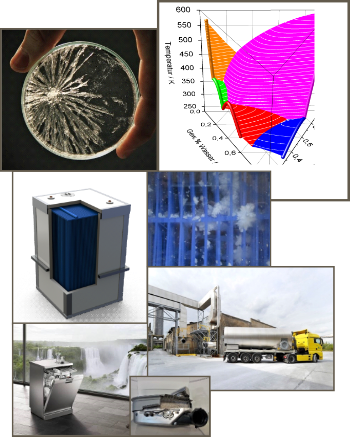
- Thermal Energy Storage
- Consulting and studies on the use of heat and cold storage in automotive, building applications,
industrial processes, household appliances, etc.
- Development of insulation materials
- Sensible Heat Storages
- Conception, design, prototyping, and system integration
- Development of large sensible heat storages
- Latent Heat Storages
- Simulation of latent heat storage systems
- Calorimetric assessment of the heat storage capacity of phase change materials (e.g. salt hydrates, paraffins) for temperatures ranging from -80 to 1,500 °C
- Determination of the thermal cycle stability of phase change materials for temperatures ranging from -40 to 200 °C
- Measuring of heat exchangers for latent heat storage or in latent heat storage systems
- Examination of crystal structures and measurement of crystallisation rates
- Thermochemical Storages
- Simulation of sorptive storages
- Determination of temperature and dew point breakdown curves for packed beds of solid sorbents (e.g. zeolites, silica gels, MOFs)
- Determination of the water absorption capacity of solid sorbents (characteristic curve) for temperatures ranging from 30 to 350 °C at 20 to 70 °C dew point temperature
- Investigation of the thermal and hydrothermal cycle stability of solid sorbents
Systems Engineering
- Municipal Energy Supply/Buildings and Quarters
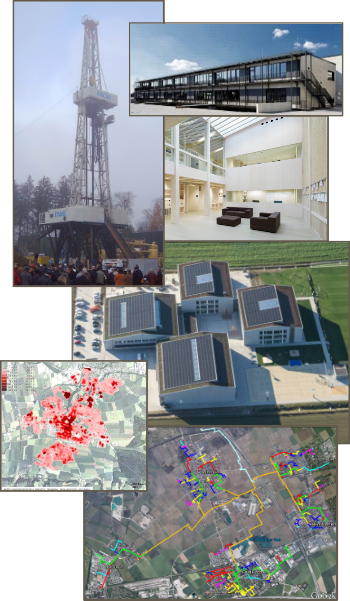
- Development of efficient, innovative, and sustainable concepts for energy supply and climate protection in municipalities
- Development of efficient, innovative, and sustainable energy concepts for buildings, quarters, and industrial sites
- Scientific consulting and support throughout all project phases, from conception to quality assurance in the planning and construction phases
- Simulation of central energy stations
- Simulation of district heating networks, e.g. for evaluation of network dimensioning and analysis of expansion scenarios
- Design and integration of innovative components
- Design and implementation of monitoring concepts for evaluation and operational optimisation after commissioning
- Economic and ecological evaluation
- Development and support of energy management systems
- Supervision of audits
- Software development
- Simulation of electrical distribution grids
- Forecasting of electricity generators and consumers
- Modelling of smart grid components (e.g. converters, batteries)
- Industry/Processes
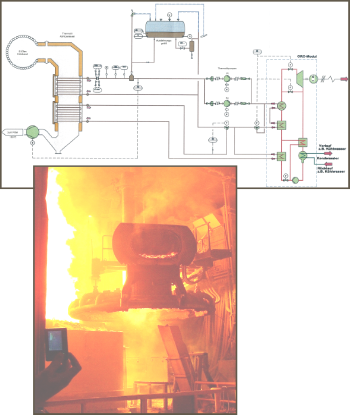
- Scientific consulting and support throughout all project phases, from conception to quality assurance in the planning and construction phases
- Design and integration of innovative components
- Design and implementation of monitoring concepts for evaluation and operational optimisation after commissioning
- Software development
- System Analysis/Scenarios
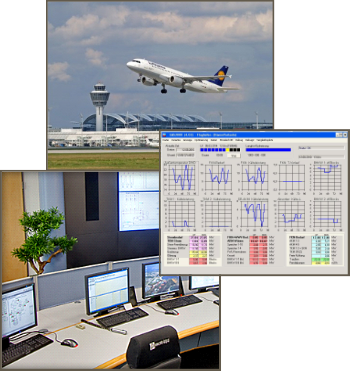
- Feasibility studies for energy system solutions
- Analysis of metrological data to evaluate the functionality and potential for optimisation of energy systems, from component to overall system level
- Simulation of energy supply systems and central energy stations
- Support in the development of scenarios and medium- to long-term planning of energy supply systems
Heat Provision
- Solar Thermal Energy
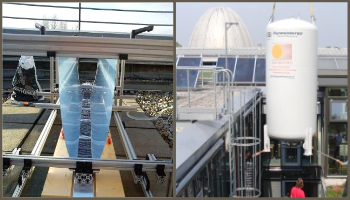
- Development of components for solar thermal energy systems (solar panels, PVT collectors, heat storages, low-temperature heating systems, etc.)
- Optimisation of solar thermal systems
- Geothermal Energy
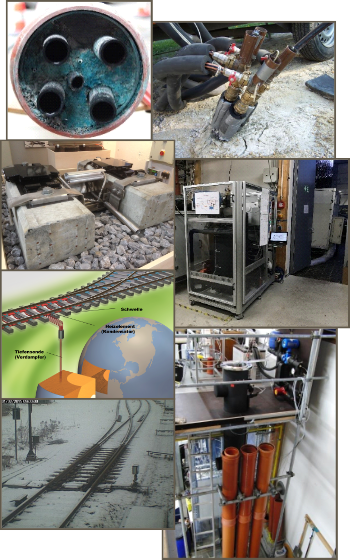
- Analysis and integration of deep geothermal energy in central energy stations
- Use of shallow geothermal energy, systems integration, and systems simulation for heat and cold provision as well as thermal storage
- Environmental impact analysis for geothermal use of the subsoil
- Development and optimisation of components
- Heat Provision for Buildings
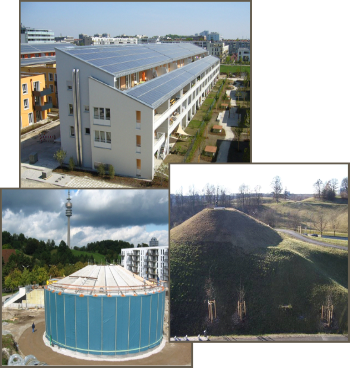
- Integration of renewable energy from district heating, shallow geothermal systems, biomass, waste heat, and solar provison
- Development of components for thermal energy systems (heat transfer stations, heat storages, low-temperature heating systems, etc.)
- Execution of independent component tests
- Planning support and metrological monitoring for demonstration projects
- Execution of thermal response tests for geothermal probes
- Verification of thermal response test equipment
- Dynamic simulations (e.g. TRNSYS, Dymola, Polysun, ANSYS)
- Economic viability studies
- Heat Provision for Industrial Processes
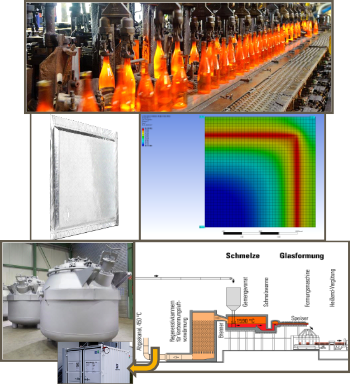
- Integration of renewable energy from district heating, shallow geothermal systems, biomass, waste heat, and solar provison
- Development of components for process heat provision (e.g. high temperature thermal insulation)
- Manufacturer-independent component testing (e.g. thermal conductivity of insulation materials)
- Planning support and metrological monitoring for demonstration projects
- Economic viability studies











